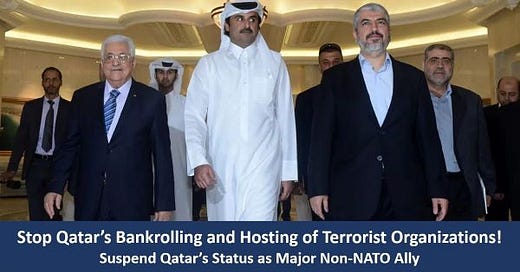Qatar Bankrolls Hamas While “Negotiating” for Hostages
Peddling Influence While Destabilizing the Globe
Qatar's Controversial Intermediary Role in Gaza War Sparks Global Concerns
Qatar's recent emergence as a key intermediary in the Gaza conflict, particularly in the hostage negotiations following Hamas's October 7 attack on Israel, has raised critical questions about the nation's geopolitical allegiances and the ethical implications of its involvement.
The Biden administration granted Qatar major non-NATO ally status in 2022. However, concerns persist regarding Qatar's support for Hamas, a designated terrorist organization, and its hosting of Hamas. The Biden administration's praise for Qatar's efforts is seen by skeptics as a potential endorsement of the nation's questionable alliances, raising concerns about the clarity and consistency of U.S. counterterrorism policies.
Stop Qatar’s Bankrolling and Hosting of Terrorist Organizations!
The recent hostage negotiations have put Qatar in a precarious position, attempting to mediate while avoiding condemnation for its association with Hamas. Sheikh Tamim bin Hamad Al-Thani, Qatar's ruling emir, has not shied away from making provocative statements against Israel's backers, accusing them of providing a "free license to kill." Such rhetoric, while resonating with anti-Israel sentiments in the Arab world, raises questions about Qatar's commitment to impartial mediation and its potential role in escalating tensions in the already volatile region.
At the forefront of these concerns is Qatar's historical support for groups designated as terrorists by the West. The gas-rich emirate has long-standing ties with Hamas, hosting its political office in Doha for over a decade. Prominent Hamas figures like Khaled Mashaal and Ismail Haniyeh, both sanctioned by the U.S., find refuge in Qatar, casting a shadow over the nation's commitment to global counterterrorism efforts.
Qatar is reported to be the main funder of major Islamic terrorist organizations including Hamas, Palestinian Islamic Jihad, al-Qaeda, and the Al-Nusra front facilitating an annual turnover of $1 billion, while also providing billions of dollars to American universities and think tanks.
Qatar's significant financial support for Hamas, estimated at approximately $360 million annually since 2021, surpasses Iran's contributions. This funding, coupled with a safe haven in Qatar, comparable to Turkey, for Hamas operation leaders where they have even coordinated and planned attacks in previous years, underscores this duplicitous relationship.
In Case You Missed It… Hamas Vows to Repeat Israel Attacks Again and Again!
Despite being a major non-NATO ally of the United States, Qatar's support for Hamas extends beyond financing to include state-sponsored media, notably through Al Jazeera, furthering Hamas's cause, and global support. Qatar-funded Al Jazeera's dissemination of anti-Israel rhetoric raises questions about its commitment to the alliance.
In addition to Qatar's relationship with Hamas, its broader pattern of supporting destabilizing movements, exemplified by its historical ties and domiciling of a figure like Khalid Sheikh Mohammed, the architect of 9/11, and the Afghan Taliban during the insurgency, underscores a strategic concern for the United States.
Qatar's strategic importance to the United States, highlighted by the Al-Udeid Air Base hosting the forward headquarters of the U.S. military's Central Command, introduces an additional layer of complexity. It facilitated the US-Taliban talks that led to the 2020 Doha Agreement and was critical in evacuation operations, airlifting thousands of foreign troops and civilians out of Afghanistan in mid-2021. While Qatar's role in facilitating the U.S. withdrawal from Afghanistan was pivotal (evacuating nearly 40% of all evacuees), questions arise about the extent to which the U.S. is willing to overlook Qatar's controversial associations in pursuit of its strategic interests.
As a non-NATO ally hosting the largest US air base in the region, Al Udeid, the US holds significant leverage to challenge Qatar's support for terrorism and destabilization, emphasizing the need for a reassessment of this behavior given Qatar's reliance on the American relationship for protection and strategic interests.
Suspend Qatar’s status as a Major Non-NATO Ally (MNNA) until the President certifies that it no longer directly supports terrorists, including Hamas. Support HR 6431, the ‘Trust But Verify Act’.








